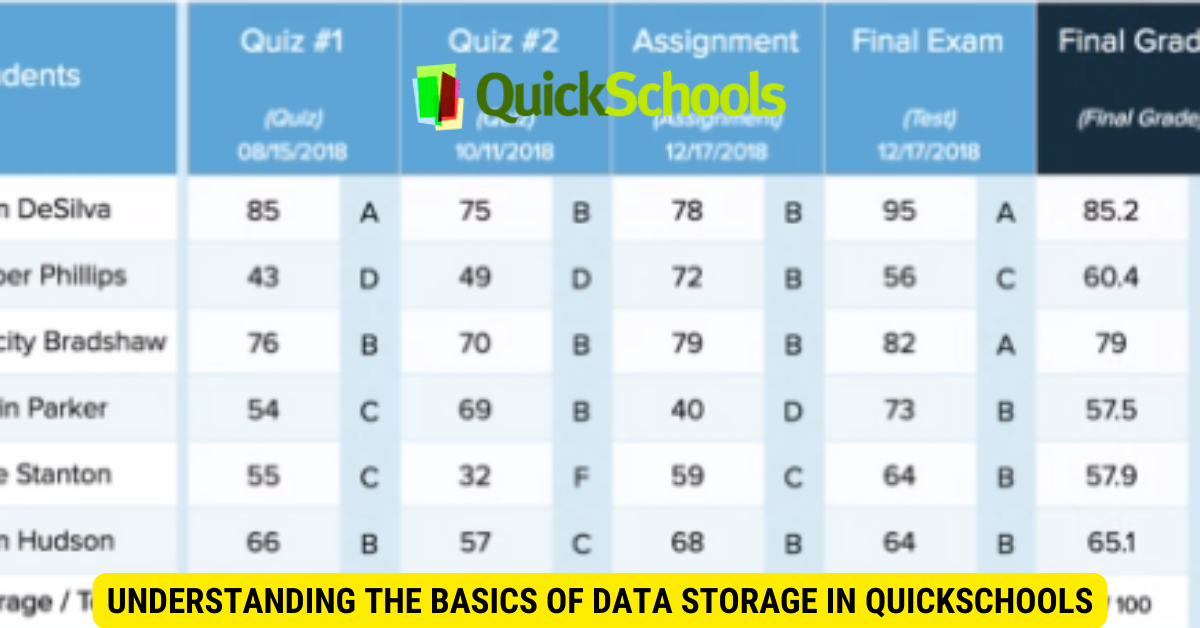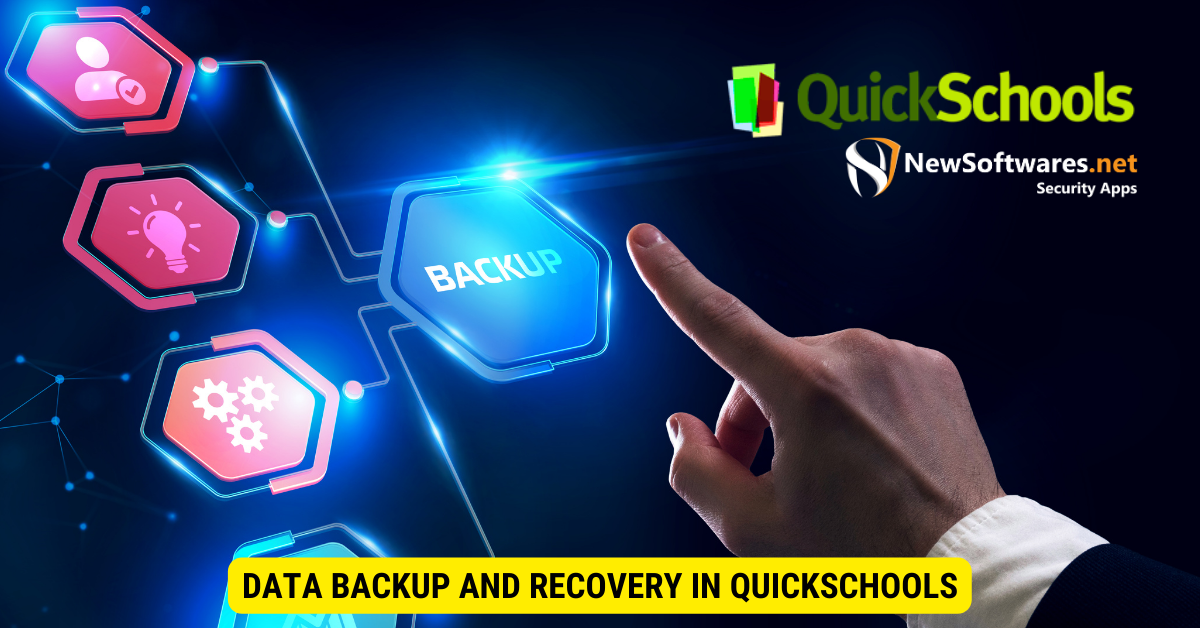Data in QuickSchools is stored in secure cloud servers with encryption and multiple layers of protection.
In today’s digital age, the storage and security of data have become paramount concerns for businesses and organizations across various industries. With the increasing reliance on technology in education, schools must also ensure that their data is well organized, easily accessible, and protected from potential threats. QuickSchools, a leading student information system provider, understands the importance of data storage and security in the academic world.
Understanding the Basics of Data Storage in QuickSchools

One of the key components of data storage in QuickSchools is its reliance on cloud-based storage. Cloud technology provides several advantages, including scalability, flexibility, and ease of access. It allows schools to store and manage vast data without physical servers or infrastructure. Cloud-based storage also enables users to access their data securely from anywhere, anytime, using any device with an internet connection.
Cloud-based storage is not only convenient but also highly secure. QuickSchools employs multiple layers of security measures to protect the stored data. These measures include encryption, firewalls, and regular security audits. By implementing these security protocols, QuickSchools ensures that sensitive info, such as student records and financial data, remains protected from unauthorized access.
In addition to security, QuickSchools also focuses on optimizing the performance and reliability of its data storage architecture. The system is designed to handle large volumes of data efficiently, ensuring schools store all necessary information without compromising performance. QuickSchools utilizes advanced technologies, such as distributed storage and data replication, to ensure data redundancy and minimize the risk of data loss.
Furthermore, QuickSchools understands the importance of data accessibility for schools. The cloud-based storage allows authorized users to access their data seamlessly from any location. This flexibility is particularly beneficial for schools with multiple campuses or remote learning programs. Teachers, administrators, and parents can access student records, attendance information, and other relevant data with just a few clicks, abolishing the need for physical paperwork and streamlining administrative processes.
QuickSchools also provides data backup and recovery services to enhance its storage system’s reliability further. Regular backups ensure schools can recover their data in unforeseen situations, such as hardware failures or natural disasters. These backups are stored in geographically diverse locations, minimizing the danger of data loss due to localized incidents.
In conclusion, QuickSchools’ data storage system is built on the foundation of cloud-based storage, offering schools scalability, flexibility, and ease of access. With robust security measures, optimized performance, and data redundancy, QuickSchools ensures schools can store and manage their data effectively. The system’s focus on data accessibility and backup services further enhances its reliability, making it a trusted choice for schools seeking a comprehensive data storage solution.
The Importance of Data Security in QuickSchools
Data security is a top priority for QuickSchools, and it employs several key principles to safeguard sensitive information. The system utilizes secure access controls, ensuring only authorized individuals can access specific data. This helps protect against unauthorized access and safeguards that data remains confidential.
But what exactly does data security entail? In the world of technology and information systems, data security refers to protecting digital info from unauthorized access, corruption, or theft. It encompasses a range of measures and protocols planned to ensure data confidentiality, integrity, and availability.
QuickSchools understands the critical importance of data security, especially in the context of educational institutions. Schools handle sensitive data, including student records, financial information, and confidential reports. Any breach of this data can have severe consequences, not only for the school but also for the students and their families.
To mitigate these risks, QuickSchools has implemented a multi-layered approach to data security. One of the fundamental principles it employs is secure access controls. Only authorized individuals, such as teachers, administrators, and parents, can access specific data. By implementing user authentication mechanisms, such as usernames and passwords, QuickSchools ensures that only those with the proper credentials can access the system and view sensitive information.
But secure access controls are just the tip of the iceberg. QuickSchools goes above and beyond to protect data by implementing various measures. For instance, the system regularly monitors activity to detect suspicious behavior or illegal access attempts. This constant vigilance allows QuickSchools to identify potential security breaches and take immediate action to prevent data compromise.
In addition to monitoring, QuickSchools also employs firewalls to create a barrier between its internal network and the external world. Firewalls act as a filter, analyzing incoming and outgoing network traffic and blocking any unauthorized access attempts. This adds an extra layer of protection, ensuring that only legitimate traffic is allowed into the system.
Furthermore, QuickSchools conducts periodic security audits to assess the effectiveness of its security measures. These audits involve comprehensive assessments of the system’s vulnerabilities, including penetration testing and scanning. QuickSchools can continuously improve its data security protocols by identifying and addressing any weaknesses and staying one step ahead of potential threats.
Another crucial aspect of data security is encryption. QuickSchools employs encryption methods to protect data during transmission and storage. Encryption involves encoding information to become unreadable without the proper decoding key. This safeguards that even if data is intercepted or stolen, it remains unintelligible to unauthorized individuals.
Overall, QuickSchools understands the paramount importance of data security in the modern digital landscape. By implementing secure access controls, monitoring system activity, employing firewalls, conducting security audits, and utilizing encryption methods, QuickSchools ensures that sensitive data remains protected and confidential. With these robust security measures, schools can have peace of mind knowing that their data is in safe hands.
Data Encryption in QuickSchools
Data encryption is an integral part of QuickSchools’ security measures. Encoding involves converting readable data into an unreadable format, known as ciphertext, using complex algorithms. This safeguards that even if unauthorized individuals gain access to the data, they cannot decipher it without the decryption key.
QuickSchools employs secure encryption techniques to guard sensitive data, such as student records and financial info. This ensures that the data remains encrypted and unusable to malicious actors even during a security breach.
One of the encryption algorithms QuickSchools uses is the Advanced Encryption Standard (AES). AES is a symmetric encryption algorithm extensively regarded as one of the most secure encryption methods available. It uses a variable key length of 128, 192, or 256 bits, making it extremely difficult for attackers to crack the encryption.
In addition to AES, QuickSchools also utilizes the RSA encryption algorithm for secure key exchange. RSA is an asymmetric encoding algorithm that uses two keys: a public key for encryption and a private key for decoding. This ensures that only authorized parties with the private key can decrypt the data, providing an extra layer of security.
Furthermore, QuickSchools implements a secure key management system to protect the encryption keys. The keys are stored in a safe location and are only accessible to authorized personnel. Regular key rotation is also performed to minimize the risk of key compromise.
Another important aspect of data encryption in QuickSchools is using secure protocols for data transmission. QuickSchools employs protocols such as HTTPS (Hypertext Transfer Protocol Secure) to encrypt data during transmission between the user’s browser and the QuickSchools servers. This ensures that data is protected from interception and tampering.
QuickSchools also maintains a strict access control policy to prevent unauthorized access to encrypted data. Only authorized personnel with the necessary privileges can access the encrypted data. This helps to minimize the danger of data breaches and ensures that sensitive information remains secure.
In conclusion, data encryption is crucial in ensuring the security and integrity of data in QuickSchools. By employing strong encryption algorithms, secure key management practices, and implementing secure protocols, QuickSchools ensures that sensitive information remains protected from unauthorized access and potential data breaches.
Data Backup and Recovery in QuickSchools

In addition to data storage and security, QuickSchools understands the critical importance of data backup and recovery mechanisms. The system incorporates robust backup procedures to defend against data loss and enable recovery in any unforeseen incidents.
Data backup involves creating duplicate copies of data and storing them in separate locations. QuickSchools follows best practices in data backup, ensuring that multiple copies are created and stored securely on-site and off-site. This redundancy decreases the risk of data loss and enables quick restoration of information in the event of accidental deletion or system failure.
QuickSchools also has a comprehensive approach to data recovery. In the rare event of data loss, the system allows schools to restore their backups quickly and efficiently. This ensures that valuable information can be retrieved and schools can continue operations without significant disruptions.
Compliance and Regulations in QuickSchools’ Data Storage and Security
QuickSchools recognizes the importance of complying with data protection laws and regulations. As an educational software provider, QuickSchools adheres to numerous data protection laws, such as the General Data Protection Regulation (GDPR) and the Family Educational Rights and Privacy Act (FERPA).
The system is designed to handle data in a manner that ensures FERPA compliance, protecting the privacy and confidentiality of student records. QuickSchools also facilitates compliance with regulations governing student data, ensuring that schools can securely store and manage sensitive information while maintaining compliance with education regulations.
Key Takeaways
- QuickSchools uses cloud storage for data, ensuring accessibility and scalability.
- Data encryption is employed both in transit and at rest.
- Regular backups are performed to prevent data loss.
- Multi-factor authentication may be used for added user security.
- QuickSchools likely has a strict data privacy policy to protect user information.
FAQs
Is QuickSchools GDPR compliant?

While I can’t directly access their latest policies, many modern platforms aim for GDPR compliance. Check their privacy policy or contact them directly.
How often does QuickSchools back up their data?
Specific backup schedules can vary; refer to QuickSchools’ documentation or support for details.
Can I choose where my data is stored with QuickSchools?
Typically, cloud services have multiple data centers globally. Check with QuickSchools for data storage options.
Is my student data safe with QuickSchools?
QuickSchools likely employs robust security measures but always reviews their security protocols and practices.
Can I export my data from QuickSchools?
Most platforms allow data exports, but you’d need to check with QuickSchools’ support or documentation for specific procedures.
Conclusion
In conclusion, data storage and security are critical aspects of any educational institution’s operations. QuickSchools stands at the forefront of providing comprehensive solutions to ensure the efficient storage and secure management of school data. Through its cloud-based storage, robust security measures, encryption techniques, data backup procedures, and compliance with regulations, QuickSchools empowers schools to focus on their essential mission of providing quality education, knowing that their data is protected and accessible when needed.
